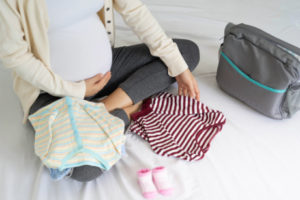Pack the Best Hospital Bag — And Not Last Minute!
I’ll never forget the day I went into the hospital to have my son. I was in the last few weeks of my pregnancy, and I went to an appointment with my OB. They did an ultrasound to check on the baby and I was excited to take a peek at my little guy. My sister was with me and we were headed to a movie and lunch date after the appointment. She was excited to get a peek at her nephew too. The doctor reentered the room just as soon as he’d left it, and quickly let me know I’d be heading to the hospital right this minute, to have a baby. I wasn’t due for another three and a half weeks! I didn’t expect this at all. I didn’t have anything packed, let alone with me. The car seat had arrived earlier this week, but I was waiting for the weekend to spend time installing it, and then have it checked by the local Child Passenger Safety Technician. I never imagined I’d be headed to the hospital nearly a month before my due date. (And that’s why everyone needs a doula!)
As I got checked into the hospital, the nurses put me into a gown and took my vitals while I rattled off a list of things I needed for my stay to my sister, along with directions on how to find them in my home. I realized I probably should have done this weeks ago. As it turns out, my haphazard descriptions were not very clear, and my sister turned up with less than half of my list. This was years before the convenience of being able to put an Instacart order in for just about anything to the hospital same day, so I ended up wearing a pair of flag shorts my sister grabbed off the clearance rack at Target for most of my hospital stay. Today, however, I am 10 years into my career as a birth and postpartum doula, and I have mastered the timing and contents of packing the perfect hospital bag.
The Best Hospital Bag Starts 1-Month Prior to Your Due Date
It’s a good idea to pack some of your essentials about a month prior to your due date. Some people prefer to keep this bag in their car so you’re ready to go at any time, since you may not be at home when labor begins. It’s not uncommon during the last month of pregnancy to be sent to the hospital for extra testing from one of your prenatal appointments if certain tests warrant further observation or testing. Many times those tests will be performed overnight, or will turn into an induction of labor, depending on results, so it’s a good idea to have your bag with you when you attend your last several prenatal appointments. If you have a history of preterm labor, or medical complications with this pregnancy such as Preeclampsia, Gestational Diabetes, or Pregnancy Induced Hypertension, you may want to pack a bag at the start of the third trimester as things can change quickly. For sizing, plan to leave the hospital at the same size you were at about 6 months pregnant. It’s best to utilize loose-fitting clothing
Printable Hospital Bag Checklist
The Best Hospital Bag For You:
Things to pack about one month before your due date:
- Labor gown or bathrobe (the hospital will provide their gowns but you can bring your own if you wish to wear something more comfortable)
- Two pairs of comfortable pajamas
- Dark-colored sports bra if you plan to labor in water
- 2-3 nursing bras if you plan to breastfeed
- 2 pairs of comfortable, stretchy pants
- 3 comfortable, stretchy shirts, with buttons or nursing top clips if planning to breastfeed
- Shoes that slip on and off (e.g. flip flops, slides, slippers)
- Snacks and drinks
- Reusable water bottle for birthing person and one for partner
- Drink mixes (such as liquid IV, powdered gatorade) for electrolytes in labor
- A folder for paperwork the hospital will give you/paperwork you need to bring to the hospital with you. Be sure to include:
- Copy of your birth plan
- Copy of your health insurance cards and pre-registration if applicable (be sure to copy the back as well so you can call and add the baby upon birth.)
- Contact information for your doctor
- Contact information for baby’s pediatrician and any other doctors your baby will see postpartum (e.g. urologist for circumcision)
- Bath towels
- Adult diapers or reusable absorbent panties (e.g. Thinx) for use postpartum (The hospital will provide you with mesh panties and large panty liners, however, some people find adult diapers or period panties to be more comfortable with less leaks and more coverage.
- Breast Pump if you plan to use one. Your insurance should provide you with a breast pump if you plan to breastfeed. Be sure to get a prescription from your doctor and call your insurance company to see if you can order one ahead of time or if you need to wait until the baby arrives.
Things to pack when you go into early labor/just before you leave for the hospital:
- Toiletries
- Hair care: shampoo, conditioner, blow dryer, hair brush, hair ties, and any other items you’d like to have on hand at the hospital
- Oral care: toothbrush, toothpaste, floss, etc.
- Deodorant, face wash, contact solution, lip balm, etc.
- Pillow (be sure to use a pillow case you do not care about)
- Items that help you rest (e.g. sleep mask, white noise machine, small fan, ear plugs)
- Extra long charging code for phone and any other devices you plan to use.
The Best Hospital Bag For Baby:
- Infant car seat (Be sure to install the base correctly in your vehicle. You can have it checked by your local fire department or a Child Passenger Safety Technician.)
- Pediatrician’s contact information (put this in your paperwork folder)
- Going home outfit
- Bottles if you plan to bottle feed from the beginning
- Pacifiers if you plan to use them
- Things you do not need to bring: diapers, wipes, dish soap for washing bottles and pump parts, receiving blankets, formula, zip-in swaddles (unless you have brand preferences for any of these items). All of these things will be provided by the hospital.
The Best Hospital Bag For Your Partner:
- Pillow and blanket or sleeping bag
- Comfortable clothing and pajamas
- Plenty of snacks
- Toiletries
- Any daily prescriptions and/or vitamins
- Entertainment (iPad, laptop, games to play for long induction, etc.)
- List of people you’d like them to notify once baby is born
- If there are older siblings, wrap a small gift from the baby to their sibling and slip it in your bag.
What First-Time Hospital Stay-ers Should Expect
For most birthing people, childbirth is their first experience with staying in the hospital for anything. As such, it can be difficult to know what to expect leading up to your stay. A hospital stay for childbirth averages between 24 hours and 3 nights. Hospitals can be noisy; people come in and out of the room frequently, and the room can often be too warm for your sleeping preferences in order to be warm enough for the baby. Operating rooms, on the other hand, are quite cold because they must maintain cooler temperatures to prevent infections from growing. It’s a good idea to pack layers for these reasons, as things can fluctuate frequently.
Doula Support to Prepare for Giving Birth in the Hospital
Would you like to know more about what to expect during a hospital stay while giving birth? Sign up to view our Webinar archives and view a recent episode, where we covered the ins and outs of giving birth in the hospital, how you can best prepare and get the most out of your hospital birth experience.

